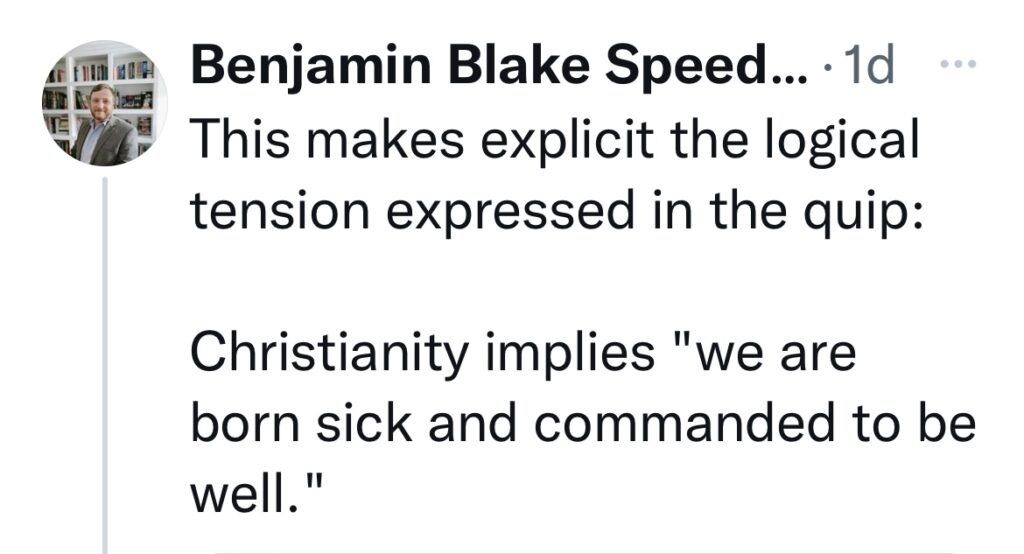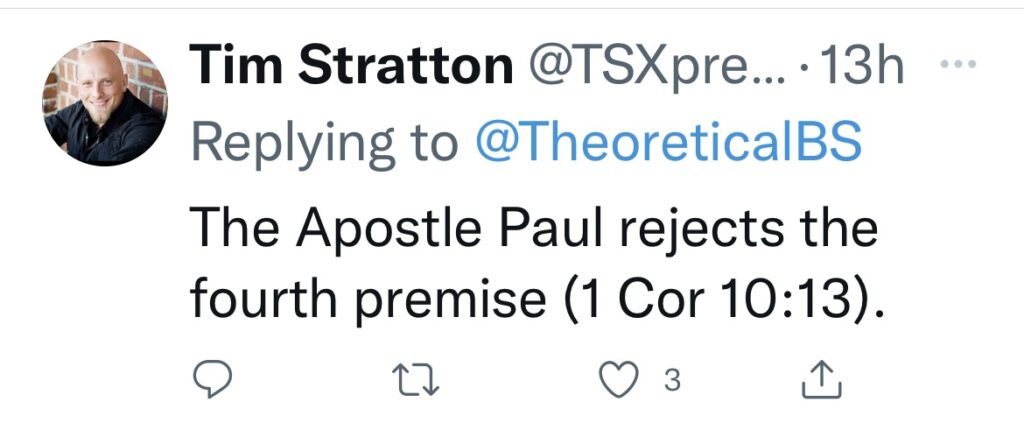Scott Clifton is a Hollywood actor who has gained fame as a soap opera star (One Life to Live, General Hospital, and The Bold and the Beautiful). He has also gained the respect of both sides of the aisle in the “God vs. atheism” debate.
Clifton is an ardent, but philosophically inclined atheist who goes by the moniker “Theoretical BS” (TBS). He recently tweeted out an argument against Christianity that left the Church scrambling. Indeed, many Christians did not know how to respond to Clifton’s logically deductive argument. Moreover, and sadly, many Christians who did respond to his tweet, provided reason to place one’s face in one’s palm.

Consider TBS’s tweet raised against the knowledge of God:

I must admit, Clifton provided a good argument for all to consider. It is based upon premises that many Christians affirm. Indeed, Theoretical BS was on his A-game to craft this argument, which, at the least, exposes the inconsistency of many churchgoers.
This led my friend Benjamin Watkins, who is also an avid atheist on Twitter, to Tweet the following:

To be clear, we are “born sick” and offered the cure. Each person is free to take the “red medicine” Christ offers, or to reject his love and grace. With that said, I was disheartened to see the lack of good responses from my fellow Christians on Twitter. I saw Calvinists suggesting that the first premise is false, and that “ought does NOT imply can.”
That’s a horrible move!
Discussing Premise (1)
Think about it: if someone says, “You really ought to fly like Superman and save the woman trapped on the 50th floor of a burning skyscraper.” You would look at him as if he were an idiot. Since you cannot fly like Superman, it makes no sense to say “you ought to fly like superman.” Now, if someone tells the trained lifeguard, “You ought to save the child struggling to keep her head above water in the 3-foot,” we know exactly why that makes sense — because the lifeguard has been trained and *CAN* help the child before she drowns.
Moreover, if you were in a boat and your wife said, “You really ought to walk on water,” you would not take her seriously because you can’t walk on water. However, if Jesus commanded you to get out of the boat and walk on water with Him, the reason why it would make sense for you to get out of the boat and run toward Him is because He would use His divine power to make it possible for you to walk on water. Thus, if Jesus says that you *ought* to walk on water, then it follows that you *can* walk on water.
Yes, the first premise of Clifton’s argument is intuitively obvious and true: “ought implies can.” To deny this premise makes Christians look foolish.
Discussing Premise (2)
Some Christians were trying to reject the second premise: “If Christianity is true, we ought to live without sin.”
Oh my! Whatever you do, do not reject premise (2). Think of all the commands to live a holy life and to avoid sin. Here is a small sampling:
Galatians 5:19-21
Now the deeds of the flesh are evident, which are: immorality, impurity, sensuality, idolatry, sorcery, enmities, strife, jealousy, outbursts of anger, disputes, dissensions, factions, envying, drunkenness, carousing, and things like these, of which I forewarn you, just as I have forewarned you, that those who practice such things will not inherit the kingdom of God.Romans 13:14
But put on the Lord Jesus Christ, and make no provision for the flesh in regard to its lusts.Hebrews 12:1
Therefore, since we have so great a cloud of witnesses surrounding us, let us also lay aside every encumbrance and the sin which so easily entangles us, and let us run with endurance the race that is set before us . . .1 Thessalonians 5:22
abstain from every form of evil.2 Corinthians 7:1
Therefore, since we have these promises, dear friends, let us purify ourselves from everything that contaminates body and spirit, perfecting holiness out of reverence for God.1 Peter 1:15-16
But just as he who called you is holy, so be holy in all you do; for it is written: “Be holy, because I am holy.”John 8:11
And Jesus said, “Neither do I condemn you; go, and from now on sin no more.”
This list could go on and on, but TBS’s second premise is supported via ample biblical data. Christians ought to avoid sin.
Discussing Premise (3)
Some might try to reject Premise (3) which reads: “From (1) and (2), if Christianity is true, we can live without sin.”
I agree with TBS. That is to say, regenerated Christ-followers can live without sin. Indeed, with the first two premises supported, it makes no sense to deny (3). We can avoid sin. That is to say, through God’s love, grace, and regenerating power, all Christians can live a holy life.
Discussing Premise (4)
This leaves only one premise remaining before we reach the dreaded death-blow of a deductive conclusion, “Therefore, Christianity is not true.” The fourth premise reads as follows:
“We cannot live without sin.”
I was shocked to see so many Christians in the Twitter-verse accept this premise. Indeed, many Calvinists (who affirm exhaustive divine determinism) advance this premise because if God determines all things, then when God determines a Calvinist to cheat on his wife (for example), it is impossible for the Calvinist to do otherwise. I was screaming at my iPhone as I was scrolling through the comments. Indeed, here’s a counter-factual:
Because of the lack of proper responses, IF I had hair, I WOULD have pulled it out!
I could not take it any longer. So, finally, I tweeted my own reply:

Only three “likes”? What’s up with that?
Anyway, because the Apostle Paul rejects the fourth premise, so do I. Indeed, based upon Paul’s words in his first letter to the Corinthians, it is possible for a Christian to avoid any sin. Consider this important passage of Scripture:
1 Corinthians 10:13
No temptation has overtaken you that is not common to man. God is faithful, and he will not let you be tempted beyond your ability, but with the temptation he will also provide the way of escape, that you may be able to endure it.
Consider this awesome promise: every time you are tempted to sin, God provides a “way of escape” so that you do not have to sin. Thus, when you sin, do not say that “the devil made me do it,” and whatever you do, do not say that “God determined me to commit this sin.” No! That response is downright blasphemous. Instead, take responsibility for your actions. You chose to fall into temptation, but you did not have to. You could have done otherwise and taken the way of escape God provided.
This also means that you possess libertarian freedom.
Now, some might respond and say that no one has ever gone the rest of his life free from sin. Really? Is that true? What about the guy who only had five minutes left to live and he spent every remaining second of those five minutes praying and praising God? It seems that this person avoided sin for the “rest of his life.”
So, if it is possible for a Christian to resist temptation for five minutes, is it possible for ten minutes? If not, why not? Is it possible for 24 hours? If not, why not? Is it possible for for a week, a month, a year, or fifty years? If not, why not?
It seems that if one grants that a regenerate Christ follower does possess the power to “take the way of escape” for the last five minutes of his life, then asserting that it would be impossible to refrain from sin for any longer period of time is just plain arbitrary and ad hoc. Indeed, if Paul is right, and in every circumstance when we are tempted to sin God also provides a way of escape so that we do not have to sin, then it is possible (it is not impossible) that a Christian who has been transformed by God’s amazing grace can live the rest of his life always choosing the way of escape God provides (again, by His grace).
Discussing the Conclusion
In conclusion, TBS’s conclusion does not follow. This is the case because the fourth premise is false. Therefore, not only does the conclusion not follow, the cumulative case of arguments for the existence of God and the truth of Christianity suggest the exact opposite of what his failed argument concludes:
Therefore, Christianity is probably true!
Thus, it makes great sense to choose to put your faith in Christ alone.
Stay reasonable (Isaiah 1:18),
Recommended resources related to the topic:
Stealing From God by Dr. Frank Turek (Book, 10-Part DVD Set, STUDENT Study Guide, TEACHER Study Guide)
I Don’t Have Enough Faith to Be an Atheist (Paperback), and (Sermon) by Norman Geisler and Frank Turek
How Can Jesus be the Only Way? Mp4, Mp3, and DVD by Frank Turek
Jesus, You and the Essentials of Christianity by Frank Turek (INSTRUCTOR Study Guide), (STUDENT Study Guide), and (DVD)
_____________________________________________________________________________________________________________________________________________________
Timothy A. Stratton (PhD, North-West University) is a professor at Trinity College of the Bible and Theological Seminary. As a former youth pastor, he is now devoted to answering deep theological and philosophical questions he first encountered from inquisitive teens in his church youth group. Stratton is founder and president of FreeThinking Ministries, a web-based apologetics ministry. Stratton speaks on church and college campuses around the country and offers regular videos on FreeThinking Ministries’ YouTube channel.
Original Blog Source: https://bit.ly/3gi0ann


















Facebook Comments